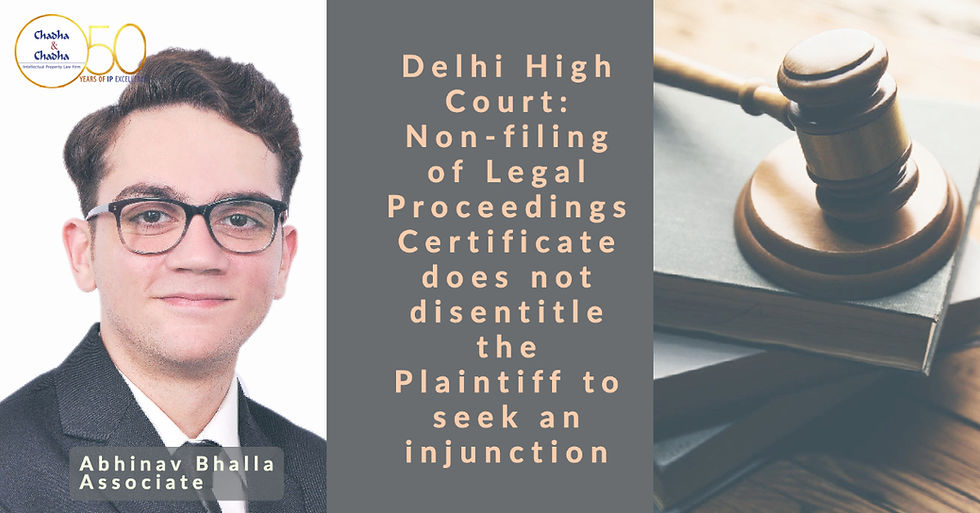Non-filing of Legal Proceedings Certificate does not disentitle the Plaintiff to seek an injunction
- Abhinav Bhalla
- Oct 18, 2022
- 4 min read

Overview
The Division Bench of the Hon’ble Delhi High Court (“the Court”) vide its decision dated September 12, 2022 in the matter titled as M/s Maan Pharmaceuticals Ltd. vs. M/s Mindwave Healthcare Pvt. Ltd[1]., in appeal, has held that even though a Legal Proceedings Certificate (“LPC”) is a crucial document that should be presented to the court when deciding preliminary applications, non-filing of the same will not affect the Plaintiff's statutory right to seek an injunction in infringement proceedings, to which it is otherwise entitled. Further, the Court held that apprehension to sell the goods with impugned trade mark in future is sufficient to confer a cause of action to file the suit.
Factual Background
The decision passed by the Court pertains to an Appeal filed by M/s Mann Pharmaceuticals Ltd. (“the Appellant”) assailing the order passed by the Learned District Judge, whereby the Application filed by the Appellant (Defendant) under Order VII Rule 10 and 11 of Code of Civil Procedure, 1908 (“CPC”) seeking return of plaint and rejection of plaint was dismissed. M/s Mindwave Healthcare Pvt. Ltd. (“the Respondent”) filed a suit against the Appellant seeking permanent injunction restraining the Appellant from using the trademark “BUPROEX-N”. The Respondent in the suit claimed to be the registered owner of the said mark and it alleged unauthorized use of the said trademark by the Appellant.
Before the Learned District Judge, the Appellant took a preliminary objection and filed an application under Order VII, Rules 10 and 11 read with Section 151 of the CPC seeking return of the plaint due to lack of territorial jurisdiction and the alleged non-compliance by the Respondent, in terms of the directions/guidelines prescribed by this Court in the case of Amrish Aggarwal v. M/s Venus Home Appliances Pvt. Ltd.[2] with regards to filing of LPCs with the suit. The Appellant had also contended that even though the registered office of Respondent had shifted to Neb Sarai, which is within the territorial jurisdiction of the Trial Court at Saket, however, at the material time when the suit was filed, the Trial Court at Saket had no territorial jurisdiction. The Appellant further contended that a suit for injunction on the basis of mere apprehension cannot be maintained being without cause.
The Learned District Judge relied on various judicial precedents with respect to ‘Quia Timet action” and held that “if the threat (to sell and offer to sale offending products within the territorial limits of the court) exists, then the court certainly has jurisdiction to entertain the present suit. The legal position is well settled that the question as to whether the court has territorial jurisdiction to entertain a suit or not has to be arrived at on the basis of averments made in the plaint and defence being immaterial, cannot be gone into at this stage”. With regards to non-filing of LPCs, the Learned District Judge held that “consequences of not filing the same would not be rejection of the plaint as the Plaintiff can only be asked to comply with the directions before the next date and/or case management hearing stage which has been undertaken by the Plaintiff”.
COURT’S DECISION
The Court in Appeal found no infirmity with the order of the Trial Court and while dismissing the Appeal, essentially held that:
· The Appellant has not been able to point out the prejudice being caused and the purpose for the plaint to be returned since the said plaint would be presented again before the same court as the registered office has been shifted to the place, where the principal sales office is located.
· There is no merit in the objection taken by the Appellant that an apprehension to sell the goods with impugned trademark in future will not confer a cause of action in favour of the Respondent to file the present suit. The Court noted that the Respondent has categorically pleaded its apprehension that the product under the impugned trademark ‘BUPROX’ is all set to be launched by the Appellant within the territorial jurisdiction of the Learned Trial Court and Appellant is also negotiating with various traders. Thus, for the purpose of Order VII Rule 11 of the CPC, only the averment in the plaint and the documents filed with the plaint are to be considered and the said documents are believed to be correct for the purpose of ascertaining whether the cause of action exists.
· Though a Legal Proceedings Certificate is an important document, which should be placed before the court at the time of deciding preliminary applications, the same, however, will not take away the statutory right of a plaintiff to seek injunction, which it is otherwise entitled to. Moreover, no prejudice is caused to the Appellant because of non-filing of the said document.
CONCLUSION
The Court’s decision in effect reiterates that procedural formalities or technicalities must not come in the way of the court from adjudicating the actual issues in dispute and merits of the case and that substantive justice must always prevail over procedural or technical justice.
































Comments